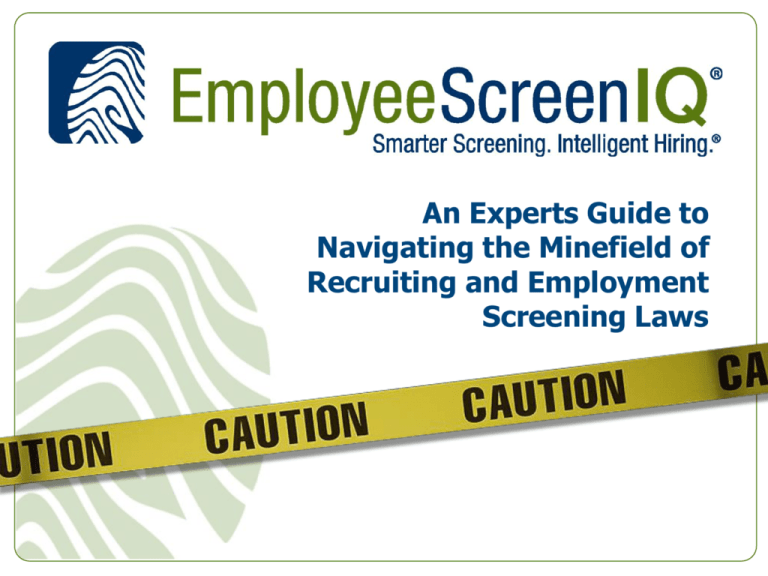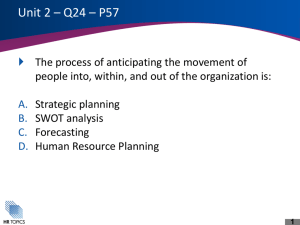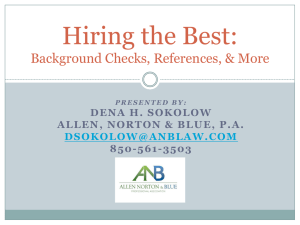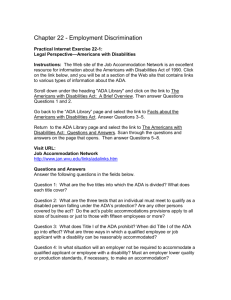Recruiting and Hiring Liabilities
advertisement

An Experts Guide to Navigating the Minefield of Recruiting and Employment Screening Laws Presenter 2 Presenter Jason Morris – President & COO Morris is a Licensed Private Investigator in the States of Ohio, New Jersey, Texas, Illinois, Arizona and Nevada. Morris also serves as an Expert Witness in the areas of background checks, employment screening and the FCRA. •President & Chief Operating Officer - EmployeeScreenIQ •Past Chairman – National Association of Professional Background Screeners (NAPBS) 3 My Diploma 4 My Diploma - $295.00 5 My Diploma - $295.00 6 My Diploma - $295.00 7 My Diploma - $295.00 8 What you will learn today! • Social Media Uses and Misuses • New EEOC Criminal Guidance • State and Federal Laws on the Horizon • Questions and Answers 9 So My Candidate’s Not An Angel? NEW YORK—Lorem ipsum dolor sit amet, con sectet uradipiscinge. Aenea nleometus, ali que tuthe ndrerit vitae, pha retraeufelis. Vesti buluma di p iscing mas sa at nislfa ucibus in luctus lacus con sequat. Pell entesque habi tant morbit ristiq uesen ectus et netus et males uada fam es ac turpi segestas. men tu mma ssa. Aenean vitae tortor in leom attiscursus. Cras suscipiturna sit ametpurus moles tievelfacilisisar ut real nos tenon mi trio mon. Aliqua mconse nuestra ti minor reiot posni creal. Pepsi Beverages Pays $3.1 Million to Settle Federal Race Discrimination Charges WASHINGTON—Pepsi Beverages Co. will pay $3.1 million to settle federal charges of race discrimination for using criminal background checks to screen out job applicants—even if they weren’t convicted of a crime. The settlement announced Wednesday with the Equal Employment Opportunity Commission is part of a 10 So My Candidate’s Not An Angel? Madison Square Garden suit hinges on alleged background check Do criminal background checks lead to bias? The EEOC will have to weigh that question when it investigates discrimination charges filed against Madison Square Garden by Charlene Clarke. Clarke, a black woman from the Bronx, accepted a food worker position at The Garden in September 2007. One month later, the arena withdrew its offer after Clarke’s background check revealed a misdemeanor assault charge five years ago. Employers have a right to use criminal background checks to screen applicants, as long as the charges relate directly 11 to the job in question. But Clarke’s complaint asserts that the arena’s withdrawal of her employment offer violated Title VII of the Civil Rights Act. Her complaint alleges “a pattern and practice of discrimination against African-American applicants for jobs at MSG.” So My Candidate’s Not An Angel? Lawsuit: Accenture Sued for Discrimination Over Background Checks NEW YORK, NY— Accenture, one of the largest management consulting firms in the world, conducts background checks that discriminate against African Americans and Latinos, a class action lawsuit filed in New York federal court today alleges. The lawsuit, filed on behalf of Roberto J. Arroyo, of Morristown, N.J., accuses Accenture of violating Title VII of the Civil Rights Act of 1964 by rejecting or firing qualified individuals who have criminal records even where the criminal history has no bearing on 12 the individual's fitness or ability to perform the job. According to the Complaint, “Such policies and practices are illegal because they adopt and perpetuate the racial disparities in the American criminal justice system ... For decades, the Supreme Court and the EEOC have recognized that overly broad Are Employers Using Social Media? NEW YORK—Lorem ipsum dolor sit amet, con sectet uradipiscinge. Aenea nleometus, ali que tuthe ndrerit vitae, pha retraeufelis. Vesti buluma di p iscing mas sa at nislfa ucibus in luctus lacus con sequat. Pell entesque habi tant morbit ristiq uesen ectus et netus et males uada fam es ac turpi segestas. men tu mma ssa. Aenean vitae tortor in leom attiscursus. Cras suscipiturna sit ametpurus moles tievelfacilisisar ut real nos tenon mi trio mon. Aliqua mconse nuestra ti minor reiot posni creal. CareerBuilder Survey: August 2010 WASHINGTON—45 percent of employers surveyed reported using social networking sites to research job candidates’ backgrounds for information that verified – or supplemented – the information on their resumes. A huge increase from the 22 percent of hiring managers who said the same thing in 2009. 13 Admit It. You Can’t Resist Social Media Landscape 14 Meet Jason Morris? 15 FCRA Lawsuits Discrimination 16 EEOC Litigation Legislation Loss Prevention Negligent Hiring Risk Management Compliance Landscape Social Media and Background Checks • Type of information that may be useful: – – – – – – – – Complaints about current employer Excessive use of social media during work hours Suggestive photos Falsification of work history/education history Illegal drug use Racial slurs Other illegal activity Culture fit 17 Social Media and Background Checks • Disadvantages: – Information may – Information may discrimination – Information may – Information may not be related to the job not be permissible—risk of be inaccurate violate right to privacy 18 Social Media and Background Checks • Discrimination: Title VII of the Civil Rights Act, Age Discrimination in Employment Act, Americans with Disabilities Act • Fair Credit Reporting Act • State Laws • Privacy 19 Discrimination • Title VII Civil Rights Act: • – “Protected Class” – Race – Color – National Origin – Religion – Gender Applies to hiring, promotion, demotion, compensation and transfer 20 Discrimination • Gaskell v. University of Kentucky – Gaskell was #1 candidate for a position as the director of the University Observatory – Member of the search committee looked up his website and writings in a personal website on the Internet – Personal website article: “Modern Astronomy, the Bible, Creation” – http://incolor.inetnebr.com/gaskell/Martin_Gaskell_Bible_As tronomy.html – E-mails circulated within the committee expressing concerns over “creationist” views – Committee said Gaskell’s religious beliefs would be a “matter of concern” and he was not hired. 21 Meet Martin Gaskell 22 Discrimination • Case settled January 2011 • University paid Gaskell $125,000 • Lessons: – Can’t “un-ring” the bell—once you look, and the information is seen by the decision maker, it is hard to deny it is a factor in the decision process – Search committee in this case documented everything in their e-mail – Search committee was not trained on antidiscrimination laws and use of web-based information 23 Fair Credit Reporting Act • FCRA Requires “Maximum Possible Accuracy” • If the FCRA applies to a social networking search conducted by a third party, the issues with accuracy include: – User generated content – Very difficult to verify information (education, past employers) – Anyone can set up a site with false identifiers and images 24 Policies and Best Practices • Develop policies on the use of social media in the hiring process • Consider removing the search process from the decision maker • Make sure “screeners” and all HR personnel are well versed in Title VII protected class status and applicable laws • Draft policies on what may and may not be considered • Consider asking applicants to disclose or provide access to information as part of the process (consult with legal counsel) 25 Policies and Best Practices • Consider providing applicant with the opportunity to respond/dispute accuracy • If information is relevant to a bona fide occupational qualification (BFOQ), communicate to the applicant with the advice of legal counsel • Be aware of state laws • Review website privacy policies and limitations of use • If you engage a third party, be sure to follow FCRA – Authorization and disclosure – Adverse action 26 EEOC Guidance • Guidance not Law (What does that mean?) • Supersedes statements given in 1987 and 1990 on conviction and arrest records • Guidance – Validations Studies – Targeted Screening with Individualized Assessments 27 EEOC Guidance - Continued • Best Practices – Ban the Box! – Develop a narrowly tailored written policy and procedure for screening applicants – The policy should identify essential job requirements and the actual circumstances under which the jobs are performed – Determine specific offenses that may demonstrate unfitness for performing such jobs, duration of exclusions for criminal conduct – Record the justification for the policy, procedures and exclusions, including a record of consultations and research considered in crafting the policy and procedures – Train managers, hiring officials, and decision makers on how to implement the policy and procedures consistent with Title VII 28 EEOC Guidance - Continued Practical Implications for Employers • Eliminate policies that exclude applicants with any criminal record. • Review your paper job applications and pre-hire documents. If you are using an ATS or web based applicant entry system, consider removing any inquires about criminal history from the application. • Limit inquiries about criminal convictions to those which are job related. • While individual assessment is not required by Title VII, the guidance implies that without it, you will have a more difficult defense. No examples are given of a scenario where an employer is successful without individualized assessment. • If an individual does not respond to an employer’s request for additional information, the employer can make a final decision without the additional information. How long or under what circumstances an employer must wait is not clear. 29 EEOC Guidance - Continued Practical Implications for Employers – Con’t • If you use a third party CRA to conduct criminal screenings, review your packages and their reporting policies to ensure compliance. • If you use a third party CRA to adjudicate criminal results, consider building in a review process to comply with the individualized assessment recommendations. • Consider FCRA adverse action procedures and ways to incorporate the request for additional information needed for individualized assessments. • Note that simply having a reputation for discouraging applicants based on race may invite investigation by the EEOC. • Large applicant pools have greater potential for disparate impact, so big employers with high turnover should seek counsel in determining the best means of compliance. • Compliance with a Federal law/mandate that conflicts with the Guidance is a defense. • State and local mandates are NOT a defense. They are pre-empted by Title VII if they “purport to require or permit the doing of any act which would be an unlawful employment practice” under Title VII. 30 State Laws • CA protects sexual orientation, marital status, pregnancy, cancer, political affiliations, genetic characteristics, gender identity. • “Ban the Box” Laws: limit the information that can be gathered on an employment application or used prior to hiring. • Other State Laws on the Horizon – CA Consumer Report Freeze 31 Where are we finding the records? *According to EmployeeScreenIQ Statistics 32 How far back? *According to EmployeeScreenIQ Statistics 33 Who Cares About Accreditation? Pick Your Pilot 34 Thank You jmorris@employeescreen.com





